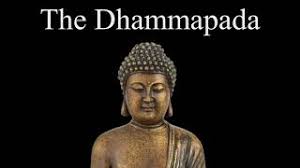The Dhammapada is an important Buddhist text. It is a collection of sayings of the Buddha in verse form and one of the most widely read and best known Buddhist scriptures. The original version of the Dhammapada is in the Khuddaka Nikaya, a division of the Pali Canon of Theravada Buddhism. It is considered one of the most popular pieces of Theravada literature. It also appears in somewhat different versions in Prakrit, Sanskrit, and Chinese, and there are translations in other languages.
Each saying recorded in the Dhammapada was made on a different occasion in response to a unique situation that had arisen in the life of the Buddha and his monastic community. It is an anthology of basic Buddhist teachings (primarily ethical teachings) in a simple aphoristic style.
The title, “Dhammapada,” is a compound term composed of dhamma and pada, each word having a number of denotations and connotations. Generally, dhamma can refer to the Buddha’s “doctrine” or an “eternal truth” or “righteousness” or all “phenomena. And, at its root, pada means “foot” and thus by extension, especially in this context, means either “path” or “verse” or both. English translations of this text’s title have used various combinations of these and related words. According to tradition, the Dhammapada’s verses were spoken by the Buddha on various occasions.
It’s collection of verses is said to constitute a perfect compendium of the Buddha’s teaching, comprising between its covers all the essential principles elaborated at length in the forty-odd volumes of the Pali canon. By distilling the complex models, theories, rhetorical style and sheer volume of the Buddha’s teachings into concise, crystalline verses, the Dhammapada makes the Buddhist way of life available to anyone. In fact, it is possible that the very source of the Dhammapada in the third century B.C.E. is traceable to the need of the early Buddhist communities in India to laicize the ascetic impetus of the Buddha’s original words. Enjoy this reading of, and reflection on, of the Dhammapada.




